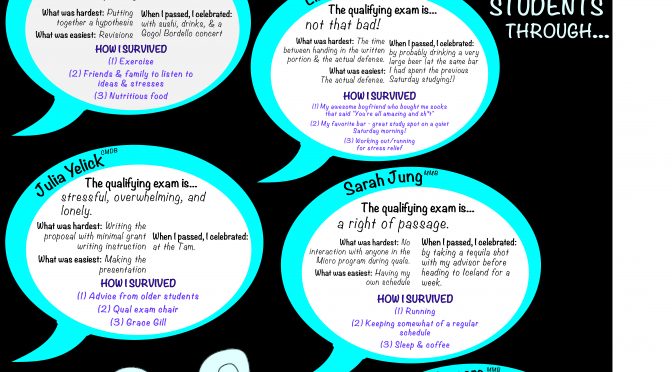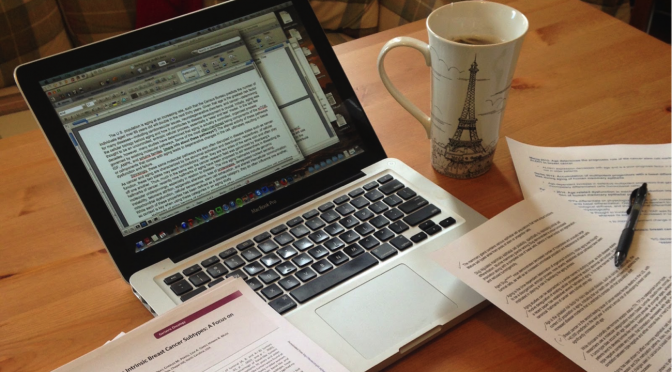
Tag Archives: qualifying exams
Qualifying Exam Survival Toolkit: Faith, Trust, & Post-Its
I read my drafted email with the attached qualifying exam proposal for the fifteenth time, hit send, and then I felt like I was going to throw up.
It was March, the snow outside was half-melted and tinged gray with grime, and I had just submitted my qualifying exam proposal. Three weeks of carrying highlighters in my pockets, drinking tea morning to night, and rarely parting from my computer, and it all came down to the click of a button. At the time, it felt like the most deciding thing I would ever do during my PhD, and that was terrifying. Looking back, it was probably just the irregular sleep hours and too much takeout that had me feeling slightly nauseous.
So, my advice, first and foremost: buy a lot of groceries and do your laundry ahead of time. I sound like a parent, I know, but still: do it. Good food and clean clothes–as well as having those tasks checked off your list in advance–really can save you in the midst of spirals of self-doubt or experimental design frustration. And you will have those moments, but it is important to know they will either pass eventually, or you will beat it by finding a way to prove yourself wrong.
Everyone–and I do mean everyone–told me, with fond amusement: you’ll be fine, it won’t be that bad, no one is out to get you. And I can tell you, with complete certainty, that is true in retrospect. I have become the older student whom I regarded with respectful but extreme skepticism this time last year. Like they said, I ended up being just fine. Still, I remember the stress and the worry, the cycle of figuring out a problem in my proposal to only have that create yet another problem, and so it went, on and on. So I will avoid telling you what most others will and instead advise this: trust your knowledge and your intuition, even if you try to convince yourself otherwise, because you do know what you are talking about. Have faith. You are going to be your own worst enemy in this four weeks of research and writing, planning and designing, but at least it is an enemy you know well. Use that to your benefit: trust your doubt, because it will help you find holes in your work where others will as well.
And there will be holes; you can’t catch them all. This is where help from older students comes in. Your practice talk with them will be one of the most valuable experiences in this process. Be prepared for your 10-15 minute talk to take an hour, or probably two, to be critiqued by your peers. You may not be able to answer all of their questions, but those are questions you then will be able to answer in your exam if they get asked. Their advice on layout and presenting style is also invaluable; they have gone through this before, and their experiences and mistakes in their own exams will be your gain. Take full advantage, even if you have to bribe them to attend with baked goods (just kidding!).
Lastly, invest in some post-its. Keep them everywhere–by your desk, by your bed, in your bag. When an idea or a question or a worry strikes, you’ll have somewhere to record it, especially if you don’t have time to deal with it at that moment.
Faith. Trust. Post-its.
Good luck!


